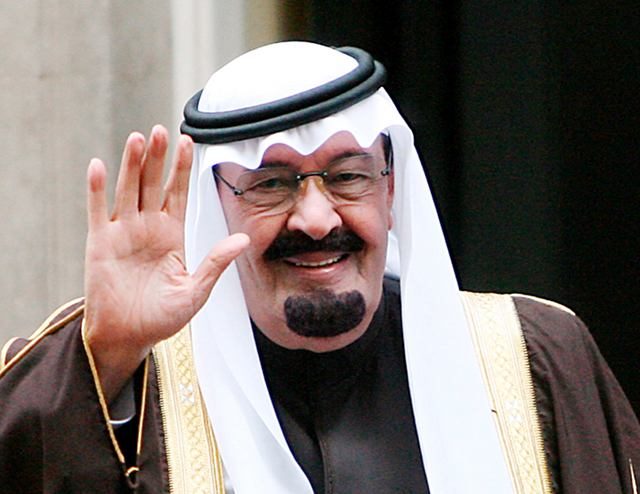SUMMARY
This is AI generated summarization, which may have errors. For context, always refer to the full article.

RIYADH, Saudi Arabia – The normally gridlocked streets of the Saudi capital were quiet on Sunday, January 25, after King Salman declared a day of mourning for his predecessor Abdullah, and more foreign leaders made their way to the kingdom.
Singapore’s Home Affairs Minister Teo Chee Hean arrived, and Venezuelan President Nicolas Maduro was on his way to offer condolences to Salman, who acceded to the throne on Friday after Abdullah’s death at the age of about 90.
US President Barack Obama announced he would cut short a visit to India to travel to the kingdom on Tuesday.
Saudi Arabia has long been a key United States ally and last year joined the US-led coalition carrying out air strikes against the Islamic State jihadist group.
Obama “called King Salman bin Abdulaziz from Air Force One today to personally express his sympathies,” the White House said on Saturday.
From across the Arab and Muslim worlds, from Europe, Asia, and America, presidents, prime ministers and sheikhs have flown in to pay their respects.
It is a recognition of the conservative Islamic kingdom’s power as the world’s leading oil exporter, a political heavyweight in a region threatened by extremist violence, and as home to Islam’s holiest sites.
Salman, a half-brother of Abdullah who reigned for almost a decade, declared Sunday a nationwide holiday “to provide comfort and facilitation to all citizens in offering condolences” and allegiance to the new monarch, the official Saudi Press Agency said.
Low-key mourning
Allegiance ceremonies began on Friday night at a palace in a historic quarter of Riyadh.
Guests rubbed cheeks and kissed the hands of the goateed Salman, 79, and his heir Crown Prince Moqren, 69.
On Saturday, ceremonies moved to the Al-Yamamah Palace, the royal court, where foreign dignitaries greeted Salman and Moqren.
Foreign Minister Mohammad Javad Zarif of Shiite-dominated Iran was among the guests, making a rare visit as Tehran tries to improve relations with its Sunni regional rival.
Both Russian Prime Minister Dmitry Medvedev and Ukraine’s President Petro Poroshenko joined the well-wishers, even as pro-Kremlin rebels announced a major new offensive on a strategic government-held Ukrainian port.
Other guests included French President Francois Hollande, Afghan President Ashraf Ghani, Indonesian Vice-President Jusuf Kalla, European royalty and Jordan’s King Abdullah II. Prince Charles and Prime Minister David Cameron came from Britain.
Outside, a helicopter patrolled overhead and four lanes of cars – everything from luxury Bentleys to everyday models – inched towards the palace grounds carrying Saudi well-wishers past guards with pistols strapped to their thighs.
Global tributes
Away from the palace and nearby roadblocks, life continued with almost no indication that a new era had begun, except for billboards expressing condolences for Abdullah’s death.
A low-key way of mourning and the burial of Abdullah in an unmarked grave are in keeping with the kingdom’s adherence to the austere teachings of 18th century Muslim scholar Mohammed bin Abdul Wahhab.
“What is not encouraged in sharia is to be hysterical” in grief, said Khalid al-Dakhil, an independent political analyst and expert on Wahhabism,
He was referring to Islamic sharia law that governs religious and secular duties in the kingdom.
Millions of Saudis would likely visit local government headquarters to offer condolences and allegiance, Dakhil said, but others would pledge “just in their hearts.”
World leaders have praised Abdullah as a key mediator between Muslims and the West, but activists criticized his human rights record and urged Salman to do more to protect free speech and freedoms for women.
“Saudi Arabia is a partner, both economic and political,” Hollande said before his arrival in Riyadh with Defence Minister Jean-Yves Le Drain.
Salman, 79, pledged to keep the conservative Muslim kingdom on a steady course and acted to cement his hold on power.
Clearing uncertainty over the transition to the next generation, he named his nephew, Interior Minister Prince Mohammed bin Nayef, 55, as second in-line to the throne behind Moqren.
Salman also appointed as defence minister one of his own sons, Prince Mohammed.
Saudi Arabia has been the driving force behind a refusal by the Organisation of the Petroleum Exporting Countries (OPEC) to slash crude output in support of prices, which have fallen by more than 50 percent since June.
Salman is widely expected to follow Abdullah’s foreign and energy policies as well as moderate reforms.
Abdullah pushed through cautious changes, challenging conservatives with such decisions as including women in the advisory Shura Council.
He oversaw accession to the World Trade Organisation, and built new cities, universities and railways.
The Al-Hayat newspaper carried full-page advertisements on Sunday pledging support for Salman and condolences on the death of Abdullah.
A cartoon in the daily pictured a Saudi couple in tearful prayer before a smiling Abdullah waving from a framed portrait.
“Rest in peace and may you go to paradise,” the couple said. – Rappler.com
Add a comment
How does this make you feel?
There are no comments yet. Add your comment to start the conversation.